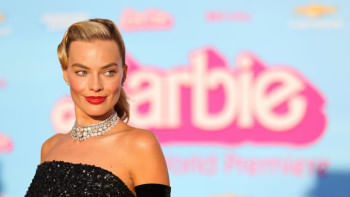White feminism and the 'Barbie' Oscar snub rant

The nominations for this year's Academy Awards (the Oscars) came out last week, and Barbie's making headlines again—for being "snubbed" from the Best Director and Best Actress categories. This "controversy" is really a manufactured one for all the wrong reasons. It's a reflection of the ridiculous entitlement—of both the makers and fans—of the most commercially successful movie of last year. There's a strange misconception that not critically rewarding this more-than-billion-dollar-making movie undermines the supposedly unworldly feminist values in the film. Barbie, a subversive satire on the patriarchy, landed eight nominations, including for Best Picture. But that's seemingly not enough. Fans and Hollywood insiders alike have taken to social media referring to Margot Robbie, the lead actress, and Greta Gerwig, the director, being left out of their respective categories as proving "the whole point of the movie: the patriarchy."
The new cycle of rage frankly shows how White feminism has gone haywire. Hillary Clinton—who has never uttered a word about the sufferings of women in Gaza—has now chimed in with her iconic White feminism. Posting on X, she writes to Margot Robbie and Greta Gerwig, assuring them they're "Kenough." Using the viral phrase "Kenough" also brings the male doll, Ken, into the picture. Clinton's self-defeating post is the perfect example of surface-level White feminist solidarity, bereft of any sort of intersectionality that can truly make a difference.
On the other hand, America Ferrera—a woman of colour, born to Honduran parents in Los Angeles—received a nomination as best supporting actress for her role in Barbie. That seems to mean nothing because she's not Greta Gerwig or Margot Robbie—the two immensely popular and commercially successful leading White women in Hollywood, both previously nominated for Oscars. The Academy has a vast history of sexism and racism, but raising hell for Barbie not sweeping every category takes us further away from advocating for inclusivity in the entertainment industry. This frankly shows that Hollywood's White feminism problem has spilled over to viewers, nurturing a culture of tone-deaf browbeating on social media.
Barbie "stans" are particularly upset that Ryan Gosling, who played Ken, received a supporting actor nod while Margot Robbie missed out—which seems to "scream patriarchy." But Gosling wasn't rewarded against Robbie. The Academy is not saying Ryan Gosling was better in the movie than Margot Robbie. There's no logic in seeing his recognition in a different category as undermining his co-star. The competition in different races are different; that's just how it is.
Yet, even Gosling himself released a statement disapproving of the Academy's decision to not nominate Robbie and Gerwig. "There's no Ken without Barbie, and there's no Barbie movie without Greta Gerwig and Margot Robbie," he stated in a wordy rant. But no recognition of any of the actors in any category is ever possible without the team effort, across multiple departments, in any film. Leonardo Di Caprio, the lead actor in Killers of the Flower Moon, was also not nominated while Lily Gladstone, his co-star, was. You don't see Gladstone ranting about Di Caprio missing out.
Gosling himself cannot seem to appreciate his own performance being honoured, perhaps in an effort to appear feminist. Even Ferrera, who received her first-ever Oscar nomination, expressed disappointment. This ostentatious theatre of calling out some supposed grave injustice against Barbie by nominated actors of the film and everyone else making a huge deal about it has another side to it: a glib indication that someone else in the categories of Best Actress and Best Director shouldn't be there.
So let's look at the lead actress category where Margot Robbie was apparently snubbed. Who should've not been nominated then? The list is the exact same as the SAG (Screen Actors Guild) awards nominations, except Sandra Huller—the German actress who delivered an exceptionally ambiguous performance in Anatomy of a Fall—being on the Oscars nominations, and not Margot Robbie. If anything, Huller making it into the list shows the voters' attention to diversity and honouring outstanding performances outside of Hollywood.
Lily Gladstone, a Native American actress who played the lead role in Killers of the Flower Moon, won the Golden Globes and the race is projected to be between her and Emma Stone—for Poor Things—who won the Critics' Choice. Most importantly, Gladstone's nomination is historic, yet it is getting drowned out beneath the alleged snub headlines for Robbie. The lead actress category was a tight race this year, with excellent performances by many actresses. Margot Robbie is not a victim of the patriarchy. She lost out in the competition, and that should be acceptable. Dropping big words like "patriarchy" where it doesn't apply is as counterproductive as it gets.
The Los Angeles Times wrote: "It was a great year for film and all of the nominees did tremendous work, but no director or actor faced the same degree of difficulty as Robbie and Gerwig." These sorts of statements are borderline racist, as they completely turn a blind eye towards the struggles of Gladstone, the first Native American woman ever nominated, who was ready to drop out of Hollywood before being cast in the movie. One of the other supporting actresses nominated, Da'Vine Joy Randolph for The Holdovers, is a Black actress who has publicly spoken about her struggles as a Black woman in Hollywood. It's their moment, but this false controversy has stolen their spotlight and turned it into a moment of darkness, to snatch further praise for Margot Robbie. And since we are talking about "snubs," Korean-American actress Greta Lee from Past Lives—who delivered a subtle yet immensely touching performance, and was nominated in the Golden Globes and in the Critics' Choice Awards—was also left out. Where's the outrage for her? Is it only anti-feminist when White women are overlooked?
Let's also take a look at Gerwig's snub, deemed as a heinous misogynistic crime. The Best Director category is voted by 582 voters, about a quarter of whom are women. Justine Triet, the director of Anatomy of a Fall—a brilliant French film—was the only woman nominated this year. But, of course, celebrating her work is not as fun as complaining about Gerwig's snub. Another point of argument for the Barbie snub has been the lack of logic in not nominating the director of a film that is up for best picture. Celine Song, the female director of Past Lives—which made it into the best film category—was also not nominated. Why is that not considered misogynistic?
There are many performances by women, non-Americans, and people of colour to be celebrated as well. There are many great films that have been rewarded in the Oscar nominations, and many that have missed the cut—such as the Origin directed by Ava DuVernay—and they deserve their fair share of recognition too.
Raging about Greta Gerwig and Margot Robbie, tearing away from the achievements of the other nominated women, and overlooking others who have also lost out in the competition just shows that Western (and specifically the US) society's feminism is still consolidated to White women. While the Oscars have a long way to go, so does everyone who has chimed in on the "Barbie got snubbed" controversy, laundering social issues (such as "women's empowerment") for the non-issue that this is.
Ramisa Rob is a journalist at The Daily Star.
Views expressed in this article are the author's own.
Follow The Daily Star Opinion on Facebook for the latest opinions, commentaries and analyses by experts and professionals. To contribute your article or letter to The Daily Star Opinion, see our guidelines for submission.

 For all latest news, follow The Daily Star's Google News channel.
For all latest news, follow The Daily Star's Google News channel. 










Comments